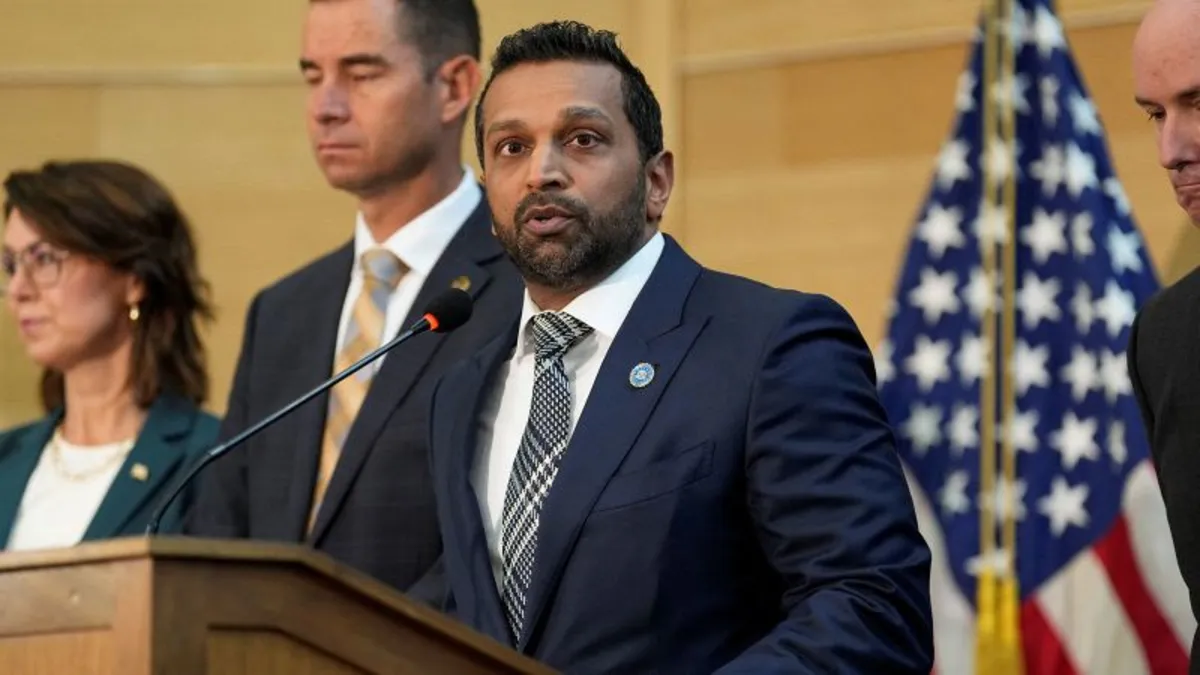
During a news conference held on Friday morning in Utah, FBI Director Kash Patel confidently outlined the series of events leading to the capture of Tyler Robinson, the suspect in the murder of conservative activist Charlie Kirk. Patel remarked, “This is what happens when you let good cops be cops,” emphasizing the effective collaboration between the FBI, state, and local law enforcement in the investigation.
In a six-minute address, Patel praised the efforts of the FBI in spearheading the investigation into Kirk's assassination, highlighting the decision to release photos and videos to the public as a pivotal moment that contributed to Robinson's arrest on Thursday evening. However, his upbeat demeanor was juxtaposed with mounting frustration among some FBI employees regarding his approach to the situation. Sources within the bureau expressed discontent with Patel's tendency to claim personal credit for significant achievements, given that he had prematurely announced earlier that a “subject” was in custody, only to retract that statement shortly after.
Many within the FBI found it contradictory that Patel would publicly commend certain support staff members crucial to the investigation, especially considering his recent decisions that had significantly reduced their numbers. This has led some allies of former President Donald Trump to question Patel's capability to lead the nation’s top law enforcement agency effectively. Patel, who has a background as a MAGA loyalist and served in Trump’s administration, was already a controversial choice to head the FBI, with critics doubting his qualifications for the role.
Influential right-wing activist Christopher Rufo voiced his concerns on social media, urging Republicans to evaluate whether Kash Patel is the right individual to lead the FBI. “We would be wise to take a moment and ask whether Kash Patel has what it takes to get this done,” Rufo stated, highlighting a growing unease among conservative circles about Patel's leadership.
The scrutiny surrounding Patel's handling of the Kirk investigation is not an isolated incident. Earlier this year, he and his deputy, Dan Bongino, faced backlash for their management of the Jeffrey Epstein files. An FBI official defended Patel’s actions, noting that the arrest of Robinson was expedited after a family member recognized him from the released images. The official pointed out that Robinson was captured more swiftly than other recent high-profile fugitives, like Luigi Mangione, who evaded capture for five days.
Despite the defense, Patel’s missteps during the investigation have raised questions about his leadership. Following the arrest, Patel communicated with the president and received positive feedback regarding the swift resolution of the case. However, the FBI declined to comment further on the investigation.
Patel’s most notable error occurred just hours after Charlie Kirk was shot at a Utah university. He prematurely announced on social media that a “subject” was in custody, conflicting with the information provided by state officials during a press conference. This miscommunication forced law enforcement officials to correct the narrative publicly, leading to internal embarrassment within the Justice Department.
As the investigation unfolded, further criticism directed at Patel arose for not promptly releasing images of the shooter to the public. Some officials believed that immediate action could have expedited the search for Robinson. The FBI released the first images of a person of interest the following morning, showcasing a man in a dark blue cap and a black T-shirt with patriotic imagery.
Another point of contention was the delay in analyzing the rifle allegedly used by Robinson. The FBI retained the weapon until late Thursday, which prompted intervention from high-ranking officials to expedite its transfer to the ATF for analysis. As details continued to emerge, unverified tips regarding the suspect's motivations circulated, but many were found to be unfounded.
On Thursday evening, Patel and Bongino traveled to Utah to assess the scene of Kirk’s murder. The FBI director quietly stood by as state officials showcased new security footage of the shooter fleeing the crime scene. The suspect, later identified by his father through FBI images, ultimately confessed to his involvement when confronted.
As the investigation into the tragic murder of Charlie Kirk continues, the scrutiny surrounding FBI Director Kash Patel raises critical questions about his leadership and decision-making capabilities. While the swift arrest of Tyler Robinson is commendable, the series of missteps and internal discontent underscore the challenges faced by the FBI under Patel’s direction. The ongoing dialogue among conservative leaders about Patel’s effectiveness as FBI director will likely shape the future of the agency and its operations.